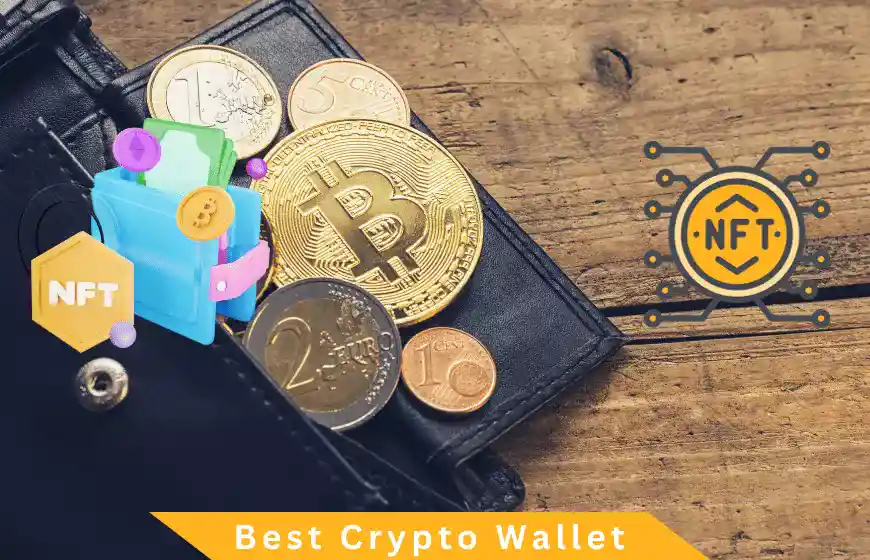Cryptocurrencies have revolutionized the financial landscape, offering a decentralized and secure way to store and transfer value. As the popularity of cryptocurrencies continues to grow, so does the importance of safeguarding your digital assets. Your choice of a best crypto wallet and the security measures you put in place are critical in ensuring the safety of your holdings.
In this comprehensive guide, we’ll explore the best practices for securing your cryptocurrency wallet. We’ll delve into various wallet types, strategies for safeguarding your assets, and tips to keep your investments safe from potential threats.
What Is a Cryptocurrency Wallet?
A cryptocurrency wallet is a digital tool that allows you to store, send, and receive cryptocurrencies. It stores your private keys, which are essential for authorizing transactions on the blockchain. Wallets come in various forms, each with its own advantages and potential vulnerabilities.
Choosing the Best Crypto Wallet

Selecting the right wallet is the first step towards ensuring the security of your cryptocurrencies. Here are the main types of cryptocurrency wallets:
1. Hardware Wallets
Hardware wallets are physical devices designed solely for storing cryptocurrencies. They offer a high level of security as they are not connected to the internet, making them immune to online threats like hacking and phishing. The best crypto wallet for long-term storage is often a hardware wallet.
2. Software Wallets
Software wallets are applications or online platforms that allow you to manage your cryptocurrencies. While convenient, they are more vulnerable to hacking. When using a software wallet, make sure to choose one from a reputable source and regularly update the software to patch any potential security vulnerabilities.
3. Paper Wallets
A paper wallet is a physical document that contains your cryptocurrency private and public keys. It is one of the most secure ways to store cryptocurrencies because it is not connected to the internet. However, it requires you to safeguard the physical document carefully.
4. Mobile Wallets
Mobile wallets are software wallets designed for use on mobile devices. They offer the convenience of quick access but can be vulnerable to malware and phishing attacks. Only download mobile wallets from official app stores and ensure your device is secure.
5. Web Wallets
Web wallets are online platforms that allow you to access your cryptocurrencies from any device with an internet connection. The security of web wallets depends on the platform’s measures. Choose reputable providers with a history of strong security practices.
Best Practices for Cryptocurrency Wallet Security
Once you’ve chosen the best crypto wallet that suits your needs, it’s essential to follow these best practices to enhance its security:
1. Enable Two-Factor Authentication (2FA)
Activate 2FA on your wallet to add an extra layer of security. 2FA requires you to provide a secondary code, usually sent to your mobile device, in addition to your password for access. This significantly reduces the risk of unauthorized access.
2. Backup Your Wallet
Regularly back up your wallet’s data, including private keys, seed phrases, and wallet.dat files. Store these backups securely in multiple physical locations to ensure you can recover your assets in case of loss or theft.
3. Use Strong and Unique Passwords
Choose strong and unique passwords for your wallet. Avoid using easily guessable passwords and consider using a password manager to keep track of them securely.
4. Keep Software Updated
Always keep your wallet software and your device’s operating system up to date. Developers frequently release updates to patch security vulnerabilities. Ignoring updates can leave your wallet exposed to potential threats.
5. Beware of Phishing Scams
Be cautious of phishing attempts, where malicious actors impersonate legitimate wallet providers. Only download wallets from official sources, double-check URLs, and never click on suspicious links or share your private information.
6. Educate Yourself
Stay informed about the latest security threats and best practices in the cryptocurrency space. Online communities and forums can be valuable resources for learning and sharing information.
7. Use Cold Storage for Significant Holdings
For significant cryptocurrency holdings, consider using a hardware wallet or a paper wallet stored in a secure location. Cold storage options are highly resistant to online threats.
8. Diversify Your Holdings
Avoid keeping all your cryptocurrencies in a single wallet. Diversify your holdings across different wallets to minimize risk. This way, even if one wallet is compromised, not all your assets will be at stake.
9. Test Small Transactions First
Before making a large transaction, test your wallet by sending a small amount to ensure everything works correctly. This can prevent costly mistakes due to technical issues or incorrect addresses.
10. Use Secure Networks
Only access your wallet on secure and trusted networks. Avoid using public Wi-Fi or unsecured connections when managing your cryptocurrencies.
Conclusion
Protecting your cryptocurrency investments is of paramount importance in the ever-evolving landscape of digital assets. Choosing the best crypto wallet for your needs and following these security best practices can help safeguard your holdings against potential threats. Stay vigilant, stay informed, and ensure that your crypto journey is both profitable and secure. Your cryptocurrency wallet’s security is in your hands.
 CryptoZink Where Innovation Meets Investment
CryptoZink Where Innovation Meets Investment
